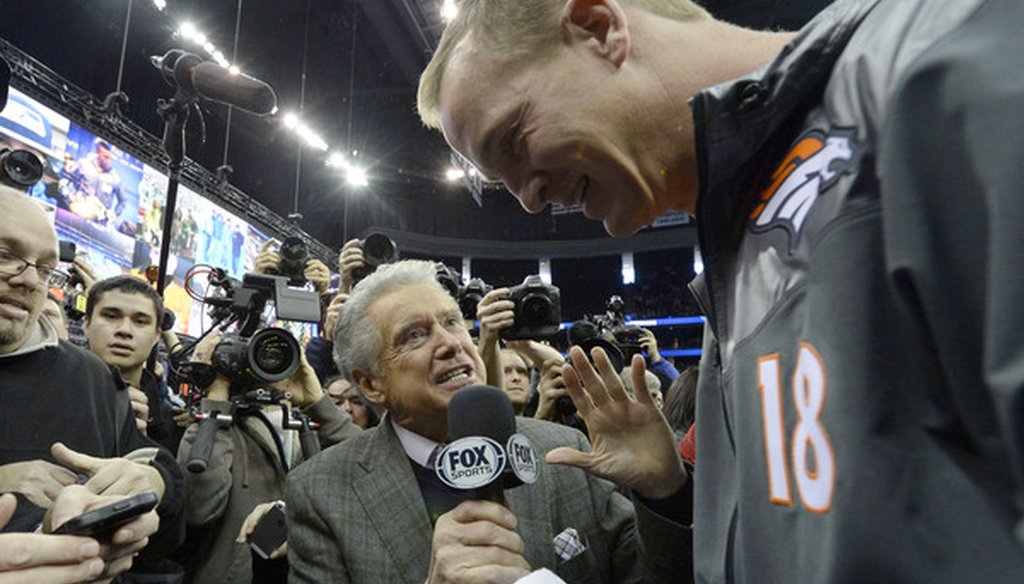Stand up for the facts!
Our only agenda is to publish the truth so you can be an informed participant in democracy.
We need your help.
I would like to contribute

Fox Sports 1 host Regis Philbin interviews Denver Broncos quarterback Peyton Manning.
Worried about the weather for the Super Bowl? Psshh.
Former New York Jets running back Curtis Martin told an ESPN audience recently that football is meant to be played outdoors. And he’s seen it much worse.
"I played in a game here against the Pittsburgh Steelers where there was 23 inches of snow, and they couldn’t get all the snow," Martin said on Mike & Mike. "We played in at least 15 inches of that. The only thing you could see on the field were the lines that they would clear out."
Martin’s recounting of the game against the Steelers turns out to be incorrect.
We know, because we checked. PolitiFact launched in 2007 to fact-check presidential candidates and grew to check politicians all over the country. In 2013, PunditFact debuted to fact-check the political talking heads.
And for one week, in the run-up to Super Bowl XLVIII, we decided to turn our attention to the sports talking heads.
What we found is that like politicians, sometimes sports analysts get things right, and sometimes they don’t.
Back in Martin’s day
An outdoor Super Bowl in February in New Jersey naturally has generated plenty of weather talk.
Martin was correct in that the Steelers did play the Jets in the snow in East Rutherford, N.J., on Dec. 14, 2003. Martin ran for 174 yards and the Jets won 6-0. The size of the snow pile, however, apparently has grown in Martin’s mind since the game was played a decade ago.
Most media reports say the teams played in several inches of snow before the snow became freezing rain in the second half. Weather history from Weather Underground, which relies on airport weather data provided by the Federal Aviation Administration, says that about 4 inches of snow fell in the East Rutherford area on Dec. 14, not 23 inches. That’s backed up by media reports and player interviews from that day, as well as photographic evidence.
There’s also the obvious problem of trying to run, let alone play, in 15 inches of snow.
PunditFact rates Martin’s claim False.
More on the weather
The claim we saw more than any other is that Denver Broncos quarterback Peyton Manning struggles in cold weather.
That claim rates Mostly True. Analysis shows that Manning is an elite quarterback in the heat or in the cold, outdoors or indoors. But Manning’s numbers generally take a dip when the temperature does.
In games where the temperature is 40 degrees or under, Manning’s passing yards and touchdowns both drop, his interceptions increase and his overall quarterback rating drops. The sample size is small, but the statistics don’t lie. (You can see this in a lot more detail at PunditFact.com.)
There are mitigating factors. Manning’s cold weather games are often on the road (hostile environment) and in the playoffs (better competition). Also, Manning’s problems with cold weather are the norm among modern day quarterbacks in the NFL, we found.
Lynch: silent and prolific
Seattle Seahawks running back Marshawn Lynch made news during Super Bowl week for trying to avoid interviews.
That led to plenty of analysis among the sports talking heads. But Joel Pratt, host of Fox Football Daily, said Seahawks fans will only care about how Lynch performs against the Broncos.
"Really, all they care about is that his production continues in the direction that it's going," Klatt said. "When you talk about postseason, second all-time in terms of average yards per rush only to Terrell Davis. So this guy can definitely play."
For his career in the playoffs, Lynch has rushed 109 times for 560 yards, or an average of 5.1 yards per rush. (Nearly 12 percent of Lynch’s playoff yards came on one 67-yard run in the 2011 playoffs. That one run raises Lynch’s average rush by more than half a yard.)
How does that compare all time?
Klatt is wrong to say that Lynch is second, or that Davis, a former Broncos running back, is first. We found plenty of people with higher averages than both players. The highest being Keith Lincoln, a former running back for the San Diego Chargers who averaged 12 yards per rush in the playoffs from 1961-65.
What Klatt meant to say, it appears, is that Lynch ranks second among players with 100 playoff rushing attempts.
By that measure, Davis is first at 5.6 yards per rush, Lynch is second at 5.1 yards per rush and former Los Angeles Raiders running back Marcus Allen is third at 5 yards per rush.
We rate Pratt’s claim Half True.
A quarterback’s league
Marshall Faulk, a Hall of Fame running back who now works for the NFL Network, says the Super Bowl MVP is "already etched in stone."
Faulk predicts Manning will take the honors, which we obviously cannot check. But in making the case for his prediction, Faulk offered some compelling statistical evidence: "Quarterbacks, they have won the MVP more than 50 percent of the time."
The numbers back up Faulk. Of the 47 Super Bowls, 26 quarterbacks have walked away with MVP honors, way more than any other position. Manning won in 2007.
Wide receivers and running backs are the next most likely positions for MVP, but they far and away trail the quarterbacks. It’s a lot tougher for defense. The last defensive player to win the award was Tampa Bay Buccaneers safety Dexter Jackson in 2003.
We rate Faulk’s claim True.
Our Sources
See individual fact-checks.











































